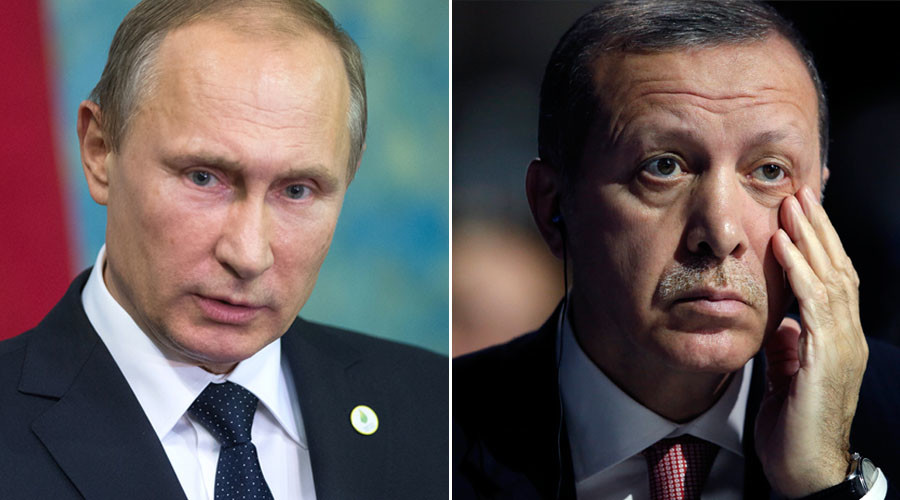Alwaght- Recent events point to weakening Turkey-Russia ties especially regarding Syria with Ankara seen as moving back to the opposing US-led camp.
Turkish President Recep Tayyip Erdogan recently visited Bahrain and Qatar and Saudi Arabia, countries which play a completely negative role in the Syrian crisis. As expected after Erdogan’s visit to Riyadh Turkey increased its aggression in Syria triggering official complaints to the United Nations by Damascus. Erdogan was quoted as saying the target after occupying Al-Bab, is the town of Manbij, and clearing Kurdish group PKK's Syrian offshoot, PYD, from the region. Officials in Turkey also say the country’s forces are also targeting Syria’s Raqaa city.
Erdogan’s harsh anti-Syria rhetoric
Erdogan’s remarks came in an interview with the Saudi-owned satellite channel al-Arabiya that was aired during his visit to the Saudi capital, Riyadh. The Turkish president told the channel that to achieve stability in the region and Syria, serious support from Persian Gulf states, led by Saudi Arabia, is needed. Turkish newspaper Hurriyet reported on Saturday that Ankara has presented two proposals to the US for how to carry out a joint military operation in Raqqa. Ankara has said repeatedly that the planned operation should be conducted by local Arab forces, possibly with support from Turkish troops, as opposed to the US-backed Syrian Democratic Force (SDF) -- an alliance dominated by Kurdish YPG militia.
CIA chief in Ankara
February 9th less than 48 hours after US president Donald Trump and his Turkish counterpart Erdogan spoke on phone, the CIA chief was in Ankara to coordinate Syria operations between the two countries. Apparently the top American spy assured Turkey that Kurds would retreat from Manbij and thus Ankara-Washington ties are set to improve after deteriorating during Obama’s presidency.
The Ankara visit by the CIA chief and Erdogan’s recent visit to Persian Gulf states have resulted and his harsh words against the Syrian government led followed by low-level participation of Syrian opposition in Astana 2 talks last Thursday all speak of Turkish about-turn in its rapprochement with Russia. Bashar Jaafari, the head of the Syria’s government delegation at the Astana 2 talks said after the talks that the actions of the Turkish and rebel delegations demonstrate that their goal is to disrupt the Astana negotiations. The first round of the Astana negotiations convened in late January after a nationwide ceasefire came into effect in Syria in December 2016. The talks were initiated by Russia, Turkey, and Iran.
Russia unhappy with Turkey
Erdogan’s incursions into Syria have not gone down well with the authorities in Moscow. In response to Turkey’s preparations to attack, Raqqa, Russian Tu-95MS long-range bombers have launched cruise missile strikes on ISIS targets near the Syrian city of Raqqa. During the attack on Friday, Russian strategic bombers destroyed several terrorist camps, training centers and a command post of one of the major terrorists' units near ISIS de facto capital of Raqqa.
The US appears to be pursuing a policy of preventing Turkey, a NATO member state, from getting closer to Russia and Washington has achieved some success in this regard.
Gullen Factor
Even though after Trump spoke with Erdogan by phone last week, the White House did not disclose of the two mentioned Turkish cleric Fethullah Gulen currently based in the US, but he appears to have been indirectly mentioned when the two presidents discussed fighting 'terrorism'. Erdogan considers Gulen a terrorist and the man behind plotting a failed coup last July whose followers were alleged to have been behind the assassination of a Russian envoy in Turkey late last year. Erdogan in now pressing Trump for Gulen’s extradition and sharply criticized the Obama administration for failing to honor that request immediately. Desperately seeking to have Gulen deported, Turkey is therefore inching closer to Trump’s administration in the hope of getting its wish granted.
Turkey’s Erdogan pursues a foreign policy which keeps shifting ground based on short term interests and brinkmanship and this makes Ankara an unreliable partner especially on regional issues which require firm stances.



























